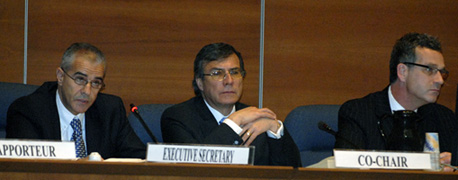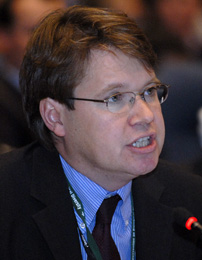|

|
|
Fifth meeting of the Ad hoc Open-ended Working Group on Access and Benefit-sharing
(ABS 5)
8-12 October 2007
Montreal, Canada |
|
|
| Highlights from Monday, 8 October |
| |
 |
|
|
The fifth meeting of the Ad hoc Open-ended Working Group and Access and Benefit-sharing (ABS 5) of the Convention on Biological Diversity (CBD) opened on Monday, 8 October 2007 in Montreal, Canada. Delegates convened in plenary throughout the day. In the morning, delegates heard opening statements and reports and addressed organizational matters. In the afternoon they began considering fair and equitable benefit sharing under the international regime on ABS.
|
|
|
| A view of the dais during the morning session |
| ABS Working Group Co-Chairs Fernando Casas, Colombia, and Timothy Hodges, Canada |
| Noting the parties' shared concern about global biodiversity loss, CBD Executive Secretary Ahmed Djoghlaf (left) said the regime will be a powerful tool for achieving sustainable development and the 2010 target to significantly reduce biodiversity loss. |
| Ambassador Martin Mbeng, Cameroon,
presented to the CBD Museum of Nature and Culture a wooden sculpture depicting the country's biological and cultural diversity.
|
Maria Elisa Oliveira, Portugal for the EU (left), emphasized their commitment to completing negotiations on an international regime on access and benefit sharing before COP-10. François Pythoud, Switzerland (right),
reported on the First International Technical Conference on Animal Genetic Resources (AnGR) for Food and Agriculture, in Interlaken, Switzerland in September 2007. |
| Shakeel Bhatti, International Treaty for Plant Genetic Resources for Food and Agriculture (ITPGR) (left),
noted that the ITPGR has operationalized ABS and offered to share its practical experience and technical lessons learned through this process. Michael Houser, International Chamber of Commerce, for business and industry (center), encouraged industry participation in all aspects of the process. Misaki Michelle Koyama, African Center for Biodiversity, speaking for NGOs (right), welcomed the recent adoption of the UN Declaration on the Rights of Indigenous Peoples. |
 |
|
|
Dan Leskien, FAO (left),
on behalf of the Commission on Genetic Resources for Food and Agriculture, updated ABS 5 delegates on the Commission's progress. Merle Alexander, Dena Kayeh Institute (center), speaking for the International Indigenous Forum on Biodiversity (IIFB),
recalled that the UN Declaration on the Rights of Indigenous Peoples affirms indigenous peoples' right to participate in decision making in matters affecting their rights. Lorena Aguillar Revelo, IUCN (right),
recommended that ABS 5 establish synergies with other international regimes, and identify mechanisms for user-friendly information dissemination.
|
Florina Lopez Miro, for the Indigenous Women's Biodiversity Network (left), stressed that without recognition of indigenous rights, especially PIC, there can be no access. Cynthia Ehmes, Federated States of Micronesia (right), for the small island developing states (SIDS) proposed including non-conventional uses of biodiversity and derivatives in the regime's scope.
|
| International Regime on ABS |
| Gurdial Singh Nijar, Malaysia (left), for the like-minded megadiverse countries, proposed specifying that national legislation should stipulate the minimum conditions for fair and equitable benefit-sharing and derivatives and/or associated traditional knowledge based on PIC and MAT. David Dutton, Australia (right) opposed textual negotiations based on the Annex to Decision VIII/4 A (international regime on access and benefit-sharing) that was transmitted to ABS 5 by COP-8, noting that his delegation could not accept any outcome in this regard. |
| Sem Taukondjo Shikongo, Namibia, for the African Group (left), proposed making access subject to minimum conditions for benefit-sharing, and including derivatives. Jorge Riaboi, Argentina (right), reserved his country's position regarding the conditions for sharing benefits from derivatives. |
| Ricardo Torres and Jimena Nieto, Colombia (left); Colombia suggested defining derivatives as products that naturally stem from the metabolism of a biological resource. Fernando Coimbra, Brazil (right), stressed that fair and equitable benefit-sharing requires an international regime and suggested it be based upon prior informed consent and mutually agreed terms. |
The Arctic Indigenous Peoples Caucus stressed that discussion on benefit sharing should follow consideration of agenda items on access to genetic resources and traditional knowledge. |
| The American BioIndustry Alliance (left) underlined that the regime should include measures that demonstrably generate benefits and provide positive incentives to encourage access to genetic resources. Robert McLean, Canada (right) suggested that any regime must be enabling and flexible. |
| CBD Executive Secretary Ahmed Djoghlaf with Pierre Simard, Government of Quebec |
| CBD Executive Secretary Ahmed Djoghlaf (left) and Cynthia Wright, Environment Canada (right) |
| Delegates chatting before the morning session convenes (left), and ENB writers speak with Valérie Normand from the CBD Secretariat (right). |
 Please e-mail the Digital Editor should you have any questions regarding the content of this page. Please e-mail the Digital Editor should you have any questions regarding the content of this page.
|
|